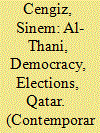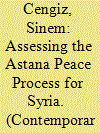|
|
|
Sort Order |
|
|
|
Items / Page
|
|
|
|
|
|
|
| Srl | Item |
| 1 |
ID:
186313


|
|
|
|
|
| Summary/Abstract |
Numerous studies have examined the decades-old Saudi-Iranian rivalry, which has played out in various regional arenas, notably Syria, Iraq, Yemen, Lebanon, and the Gulf. This article explores the place that Kurdistan Regional Government (KRG) in northern Iraq occupies within this rivalry. As the KRG’s foreign relations have attracted scholarly attention since the late 1990s, the article examines the Saudi Arabia–KRG relations in the post-2003 Iraq War, with a special focus on growing Iranian influence in Iraq. The end of Saddam Hussein’s rule and the subsequent rise of Shiite-dominated governments in Baghdad has shaken the regional balance, bringing out Iran as an influential actor in the Middle East. This laid the foundation for new understandings in the Saudi regional policy as Riyadh emphasized its relations with Iraq and the KRG, which became a crucial factor that can balance and imbalance power in the Middle East. It argues that common concerns for security and relative gains paved the way for a closer relationship between Riyadh and Erbil to counter threats emanating from both Iran and ISIS. Through case-specific information to those interested in Kurdish politics and the Middle East, it not only delves into the driving forces behind Riyadh-Erbil relations but also aims to present the Saudi interpretation of the 2017 Kurdish referendum.
|
|
|
|
|
|
|
|
|
|
|
|
|
|
|
|
| 2 |
ID:
174375


|
|
|
|
|
| Summary/Abstract |
Since 2011, numerous peace initiatives have been initiated out by several actors to end the Syrian civil war in a peaceful way. This article presents the “Astana Peace Process” brokered by Russia, Turkey, and Iran in early 2017 as a case study of a mediation and examines its predecessors to understand the reasons for the failures of those attempts and develops an assessment of the Astana peace process itself. To gain a better understanding of the Astana peace process, this article incorporates the efforts of main actors, their approaches, and the context of the war. In doing so, the article begins by describing the background of the civil war and then uses traditional concepts in mediation theory to elucidate the limitations of the unsuccessful attempts. Next, it investigates how the Astana peace process was different and the driving factors that encouraged the states to engage in this process and argues that Astana peace process’s overall effectiveness is likely to remain limited due to the conflicting interests of the mediators.
|
|
|
|
|
|
|
|
|
|
|
|
|
|
|
|
|
|
|
|
|